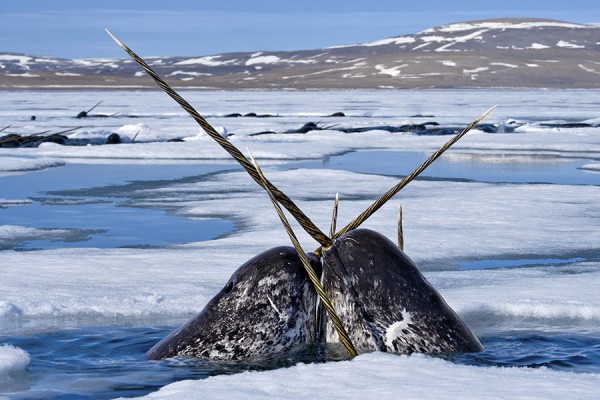 Narwhal are among the predator species affected by changes in the habits of Arctic cod. Photo ©Paul Nicklen.
Narwhal are among the predator species affected by changes in the habits of Arctic cod. Photo ©Paul Nicklen.
As changing climates cause Arctic ice to recede, allowing for more ship traffic, the noise from anchored and moving vessels is another stress on the region’s sea life, including a key species in the ecosystem — Arctic cod.
A study led by the Great Lakes Institute for Environmental Research and published in the journal Ecological Applications indicates the disturbance not only causes the fish to relocate, but alters their natural behaviours.
The shift in distribution impacts food availability for other marine wildlife and, in turn, native Arctic communities, suggesting a need to develop international conservation management strategies to protect the region’s future, says lead author Silviya Ivanova.
“Our results imply that if the Arctic ecosystem and its human inhabitants are to remain resilient to the pressures of climate change, consideration of underwater acoustic disturbance as an environmental stressor will be required,” says the doctoral student.
In August and September of 2012, while seven vessels visited Resolute Bay, Nunavut, the research team used acoustic telemetry and sound scape modelling to quantify the effect of their presence and movement on the home ranges and movement behavior of Arctic cod — a vital species in the region and preferred source of food for seabirds and marine mammals, such as beluga whales and ringed seals.
The researchers found that the cod chose to move away to areas with lower noise levels outside of their preferred habitat.
Professor Aaron Fisk notes that climate change is causing warmer ocean temperatures, Arctic ice is melting and, with it, the barrier to travelling by boat to the region. Cruise ship traffic has doubled in the past 20 years, and the number of days vessels spend in the Arctic has quadrupled. This increase is expected to continue, bringing with it an increase in acoustic noise.
“Our results identify yet another stressor to consider in the rapidly changing Arctic ecosystem,” says Dr. Fisk. “The noise associated with increasing ship traffic needs to be considered in management and conservation efforts.”
Read the full study, entitled “Shipping alters the movement and behavior of Arctic cod, a keystone fish in Arctic marine ecosystems.”



